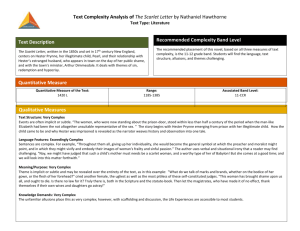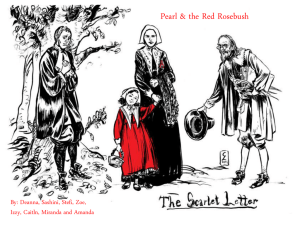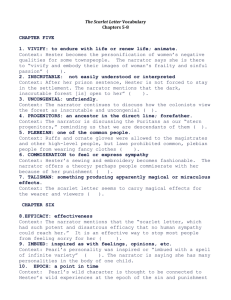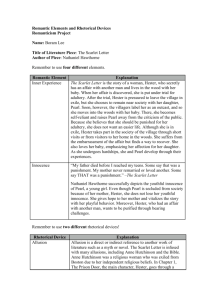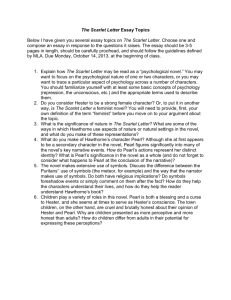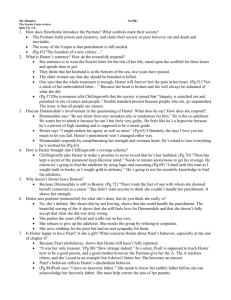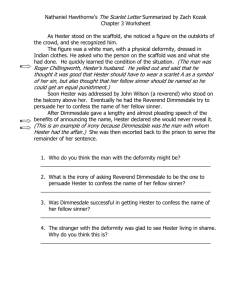Chapter 7
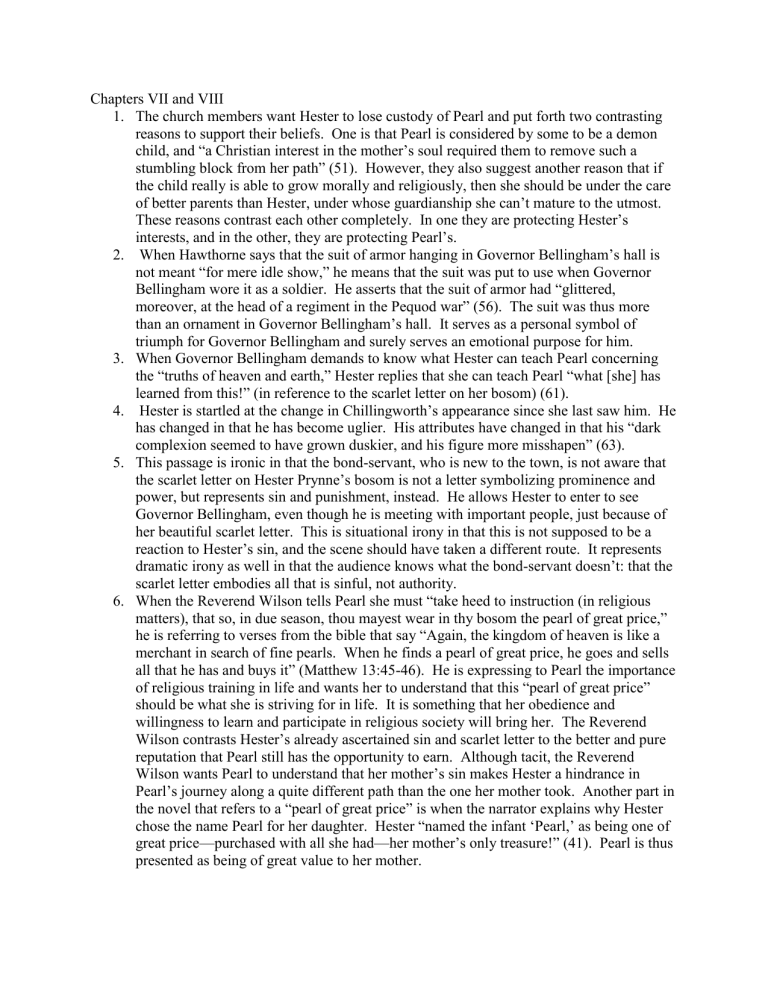
Chapters VII and VIII
1.
The church members want Hester to lose custody of Pearl and put forth two contrasting reasons to support their beliefs. One is that Pearl is considered by some to be a demon child, and “a Christian interest in the mother’s soul required them to remove such a stumbling block from her path” (51). However, they also suggest another reason that if the child really is able to grow morally and religiously, then she should be under the care of better parents than Hester, under whose guardianship she can’t mature to the utmost.
These reasons contrast each other completely. In one they are protecting Hester’s interests, and in the other, they are protecting Pearl’s.
2.
When Hawthorne says that the suit of armor hanging in Governor Bellingham’s hall is not meant “for mere idle show,” he means that the suit was put to use when Governor
Bellingham wore it as a soldier. He asserts that the suit of armor had “glittered, moreover, at the head of a regiment in the Pequod war” (56). The suit was thus more than an ornament in Governor Bellingham’s hall. It serves as a personal symbol of triumph for Governor Bellingham and surely serves an emotional purpose for him.
3.
When Governor Bellingham demands to know what Hester can teach Pearl concerning the “truths of heaven and earth,” Hester replies that she can teach Pearl “what [she] has learned from this!” (in reference to the scarlet letter on her bosom) (61).
4.
Hester is startled at the change in Chillingworth’s appearance since she last saw him. He has changed in that he has become uglier. His attributes have changed in that his “dark complexion seemed to have grown duskier, and his figure more misshapen” (63).
5.
This passage is ironic in that the bond-servant, who is new to the town, is not aware that the scarlet letter on Hester Prynne’s bosom is not a letter symbolizing prominence and power, but represents sin and punishment, instead. He allows Hester to enter to see
Governor Bellingham, even though he is meeting with important people, just because of her beautiful scarlet letter. This is situational irony in that this is not supposed to be a reaction to Hester’s sin, and the scene should have taken a different route. It represents dramatic irony as well in that the audience knows what the bond-servant doesn’t: that the scarlet letter embodies all that is sinful, not authority.
6.
When the Reverend Wilson tells Pearl she must “take heed to instruction (in religious matters), that so, in due season, thou mayest wear in thy bosom the pearl of great price,” he is referring to verses from the bible that say “Again, the kingdom of heaven is like a merchant in search of fine pearls. When he finds a pearl of great price, he goes and sells all that he has and buys it” (Matthew 13:45-46). He is expressing to Pearl the importance of religious training in life and wants her to understand that this “pearl of great price” should be what she is striving for in life. It is something that her obedience and willingness to learn and participate in religious society will bring her. The Reverend
Wilson contrasts Hester’s already ascertained sin and scarlet letter to the better and pure reputation that Pearl still has the opportunity to earn. Although tacit, the Reverend
Wilson wants Pearl to understand that her mother’s sin makes Hester a hindrance in
Pearl’s journey along a quite different path than the one her mother took. Another part in the novel that refers to a “pearl of great price” is when the narrator explains why Hester chose the name Pearl for her daughter. Hester “named the infant ‘Pearl,’ as being one of great price—purchased with all she had—her mother’s only treasure!” (41). Pearl is thus presented as being of great value to her mother.
7.
On behalf of allowing Hester to keep Pearl, the Reverend Dimmesdale argues that God has given Pearl to Hester both to remind her of her sin so she doesn’t fall deeper into the depths of it and as a blessing that would constitute the one joy in Hester’s life. God has made Hester and Pearl’s relationship a sacred one, and these gentlemen would be devastating what God had intended were they to take Pearl away from Hester.
Dimmesdale asserts that Hester realizes the deed God has performed on behalf of her heart’s need of a sustaining factor.
8.
Chillingworth does not want Hester to be able to keep Pearl. He recognizes
Dimmesdale’s heartfelt tone and is displeased that Hester has won her case. He also inquires as to whether the men will revive their search for who Pearl’s father and Hester’s lover is. The men, however, believe that his name will be known if that is what fate has in store. While the other men make comments concerning the good points of
Dimmesdale’s argument, Chillingworth does not commend him for speaking well or providing legitimate reasons for Hester to keep Pearl.

